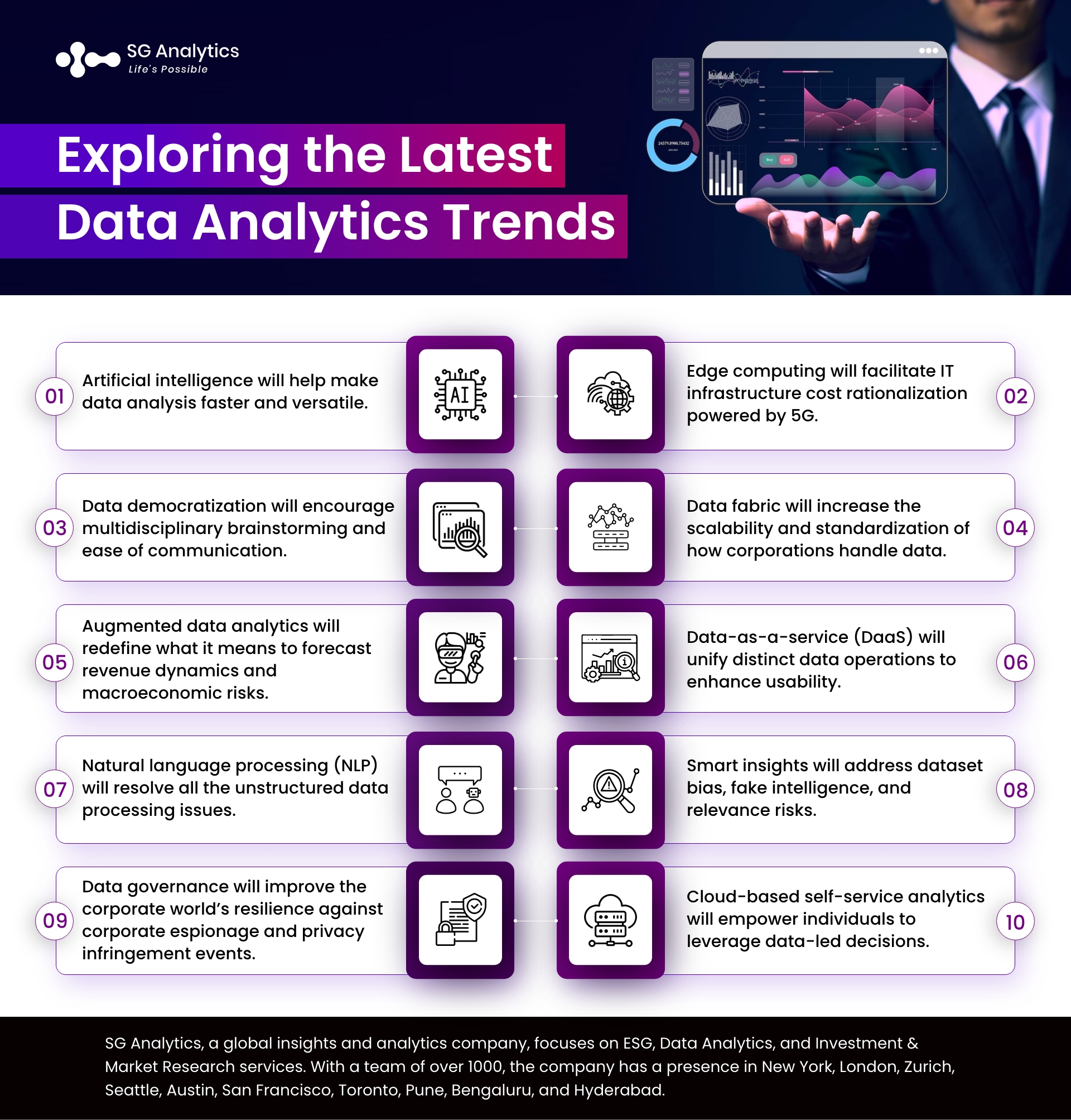Data analysts facilitate insight discovery and reporting to let business managers optimize their growth strategies for maximum effectiveness. Therefore, corporations can overcome the drawbacks of conventional business development methods. Besides, advanced technological aids enable extensive automation of analytical work. This post will explore the related data analytics trends and industry insights.
Latest Data Analytics Industry Trends
Trends in data processing encompass artificial intelligence integrations, augmented analysis, natural language processing (NLP), and more. These developments also involve specific challenges and opportunities concerning a company’s financial performance. As a result, leaders must monitor these trends in the analytics industry below.
Data Analytics Trends
-
Artificial Intelligence Reshaping Analytics Landscape
Automated data analytics services empower corporate teams to redirect their effort to more creative tasks. After all, they can acquire the insights they ask for without investing time and energy in manually configuring data analysis models and insight validation.
At the core of automation and robotics, the world finds modern tech like artificial intelligence (AI), machine learning (ML), neural networks, and vast datasets. These innovations also help brands accomplish comprehensive process overhauls. For example, unique data analytics programs can categorize unstructured data without human intervention throughout the day and night.
Read Also: How is Artificial Intelligence Shaping the Future of the BFSI Sector?
-
Edge Computing’s Impact on Advanced Analytics
Storing and processing data near the source allows for data storage cost reduction. Moreover, debugging, maintaining, and updating the underlying IT infrastructure will become more streamlined. Remember, you do not need to shut down or pause the entire data transfer ecosystem to look after edge computing technology.
The data storage and processing collectively form the “compute” in edge tech. With the rising availability of 5G network providers, edge devices can communicate with each other and the cloud fast with greater precision.
-
Data Democratization’s Role in Transforming Analytics
Transparency is not overrated. Today’s top enterprises recognize this fact, which nudges them into embracing multidisciplinary brainstorming. If data stays within the departmental silos, businesses will miss the creative solutions their employees have to offer. So, liberating data and encouraging each department to collaborate with other business units is essential.
Democratization of data involves letting all workers access and exchange an organization’s business intelligence (BI) assets. Therefore, it helps managers push for employee engagement boost and innovation irrespective of each worker’s academic or vocational background.
Related: What Is Data Democratization? How is it Accelerating Digital Businesses
-
Weaving Data Fabric for Cohesive Analytics
If a data management platform assists its clients across all the stages in a data lifecycle, its architecture can be scalable through cloud integrations. This administrative and data modification framework’s scalability highlights why a data fabric approach is vital to achieving optimal operating costs.
A data fabric enables corporations and data managers to standardize how they gather, validate, store, transform, analyze, and archive (or remove) data. For instance, one data fabric can ensure that your sales or customer analytics activities stay the same across all the branch offices. These standardization opportunities facilitate uniform reporting and ease of data sharing.
-
Augmented Analytics Pioneering a New Era in Data Exploration
Augmented analytics software will leverage AI and ML to extend what the data analysts can accomplish using statistical models and visual reports. Consider predictive data analytics that estimates how the future consequences of a policy shift will help or hurt a company’s revenue.
Several decision-makers and business strategy providers rely on identical tools powered by augmented analytics. Accordingly, the use cases of this technical approach can include animated data visualization dashboards that depict an event’s dynamics in real time.
-
Data-as-a-Service Redefining Analytics Accessibility
A firm might want to develop a data warehouse or integrate business intelligence tools with a cloud-based software platform. And doing so will require the skills and wisdom of experienced data analysis specialists. However, every talent acquisition officer knows how challenging it is to find the best candidate well-versed in the analytics’ nuances and practical considerations.
Data-as-a-service (DaaS) seeks to resolve this skills-gap crisis by helping organizations worldwide benefit from advanced data analytical tools and reports. Novel DaaS applications offer user-friendly interactive environments to simplify analytics for business leaders. Thanks to data-as-a-service, your teammates no longer need to know Python, COBOL, or abstract mathematics to forecast revenue and visualize the associated insights.
Read Also: Decoding Data-As-A-Service: Benefits Challenges
-
Natural Language Processing (NLP) Revolutionizing Data Understanding
Computers are excellent at subtraction, calculus, and mathematical logic. Still, they struggle if you ask them to find answers to your contextual and descriptive queries by processing unstructured data. Simultaneously, NLP, or natural language processing, techniques are evolved, fixing the issues like context identification and unstructured data analytics.
This remarkable advancement in software engineering eliminates the need for structured database queries. Even if your data retrieval requests lack syntax, the computers can “understand” your intentions and list the relevant records in a database. Moreover, multilingual NLP-led analytics techniques can redefine how market researchers study consumer responses and reviews anywhere in the world.
-
Data Analytics Automation Fueling Smart Insights
Analytical process automation (APA) provides brands with insight discovery and reporting systems that can “think for themselves.” These computing environments can detect bias in databases and extracted insights. So, they will revise the core models, repeat the data processing stages, and re-evaluate whether the reported insights are accurate, relevant, and profitable.
Smart insights outline how automated data analytics can evolve further. Instead of a finite scope concerning data collection, storage, and categorization, automation in data analytics can go beyond. Consequently, smart insights can be indispensable in combating fake news and manipulated data.
-
Data Governance as the Cornerstone of Effective Analytics
Unauthorized changes to your company’s core BI databases can jeopardize the policies and business strategies relying on data integrity. At the same time, consumers, investors, and government officials suspect the private sector’s data processing tasks. Data governance tools, a sustainable development requirement, will let organizations address stakeholder reservations and secure digital assets.
Ensuring data security and privacy is the fundamental objective of a data governance framework. From a data analytics perspective, it also involves regulating who can collect the data, who can supply it to a third party, and how to prevent cybersecurity threats arising from its usage. For example, marketing firms must collect consent from consumers before processing their data. Likewise, businesses must deploy a strict data access authorization protocol and end-to-end encryption (E2EE).
Related: Why Organizations Need to Leverage Data Governance on Dark Data
-
Cloud-Based Self-Service Data Analytics Embracing the Digital Sky
Can a micro-enterprise utilize marketing analytics? Will a freelancer have access to advanced sales analytics features? From school principles to non-governmental organizations (NGOs), self-service analytics platforms have proved that cloud-based technology enhances the global adoption of analytical models.
Data-led decisions improve life for all: businesses, banks, NGOs, schools, hospitals, investors, military, and more. As such, cloud-powered self-service analytics solutions are non-negotiable to unlocking historical milestones in digital literacy.

Conclusion - Data Analytics Trends
Data analytics trends discussed above illustrate that this industry has continuously innovated. Therefore, everyone, a startup founder or a global bank, can benefit from enhanced decision-making based on qualitative data insights.
Amid rising interest in how corporations process data, trends like data governance and democratization are beacons of hope for increasing stakeholders’ faith in brands. Furthermore, user-friendly data analysis services have freed the data from organizational silos, inspiring more dynamic multidisciplinary discussions. And AI-driven data analytics will pioneer even more outstanding trends.
With a presence in New York, San Francisco, Austin, Seattle, Toronto, London, Zurich, Pune, Bengaluru, and Hyderabad, SG Analytics, a pioneer in Research and Analytics, offers tailor-made services to enterprises worldwide.
A leader in Data Solutions, SG Analytics focuses on leveraging data management analytics and data science to help businesses discover new insights and build strategies for business growth. Contact us today if you are looking to make critical data-driven decisions to prompt accelerated growth and breakthrough performance.
About SG Analytics
SG Analytics is an industry-leading global insights and analytics firm providing data-centric research and contextual analytics services to its clients, including Fortune 500 companies, across BFSI, Technology, Media and entertainment, and Healthcare sectors. Established in 2007, SG Analytics is a Great Place to Work® (GPTW) certified company and has a team of over 1100 employees and has presence across the U.S.A., the U.K., Switzerland, Canada, and India.
Apart from being recognized by reputed firms such as Analytics India Magazine, Everest Group, and ISG, SG Analytics has been recently awarded as the top ESG consultancy of the year 2022 and Idea Awards 2023 by Entrepreneur India in the “Best Use of Data” category.











